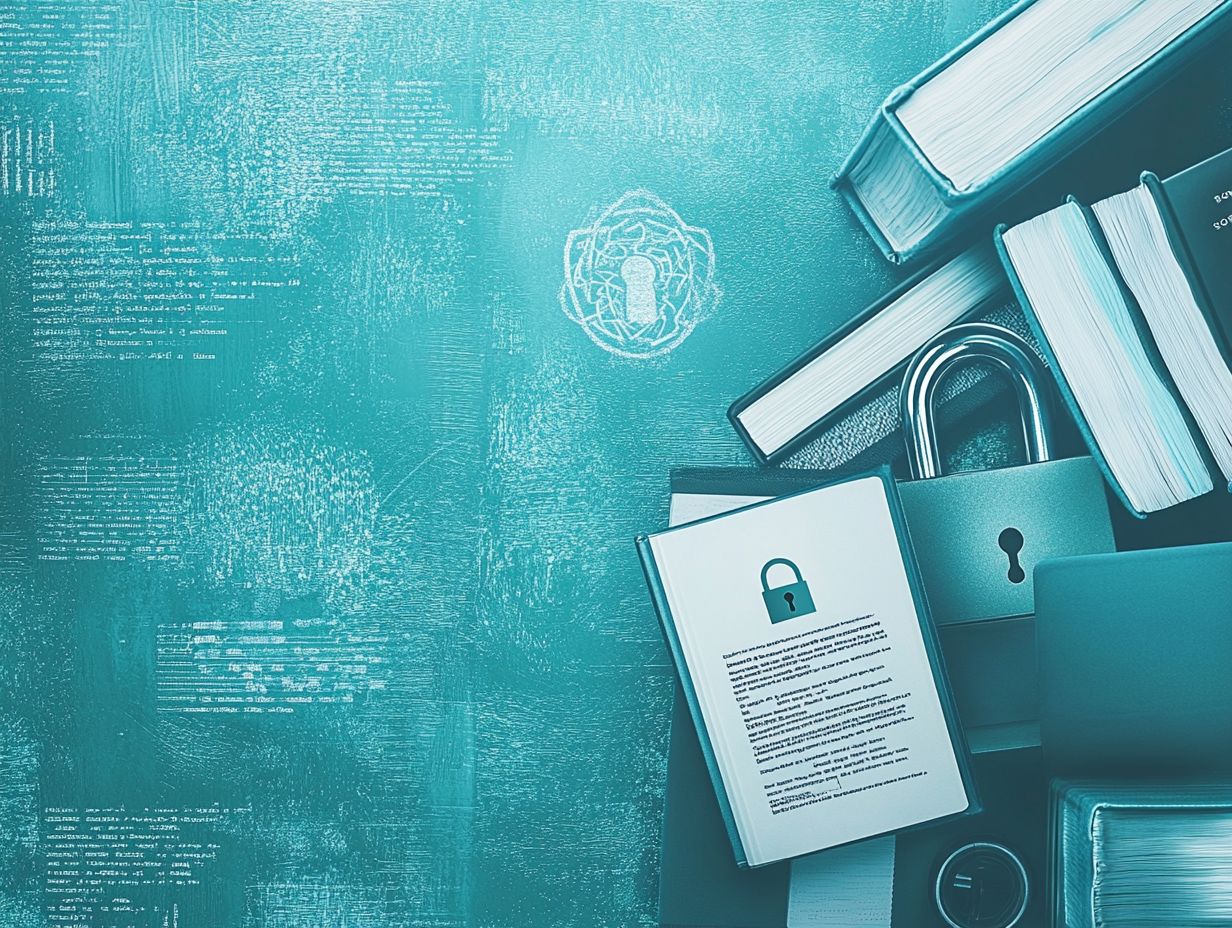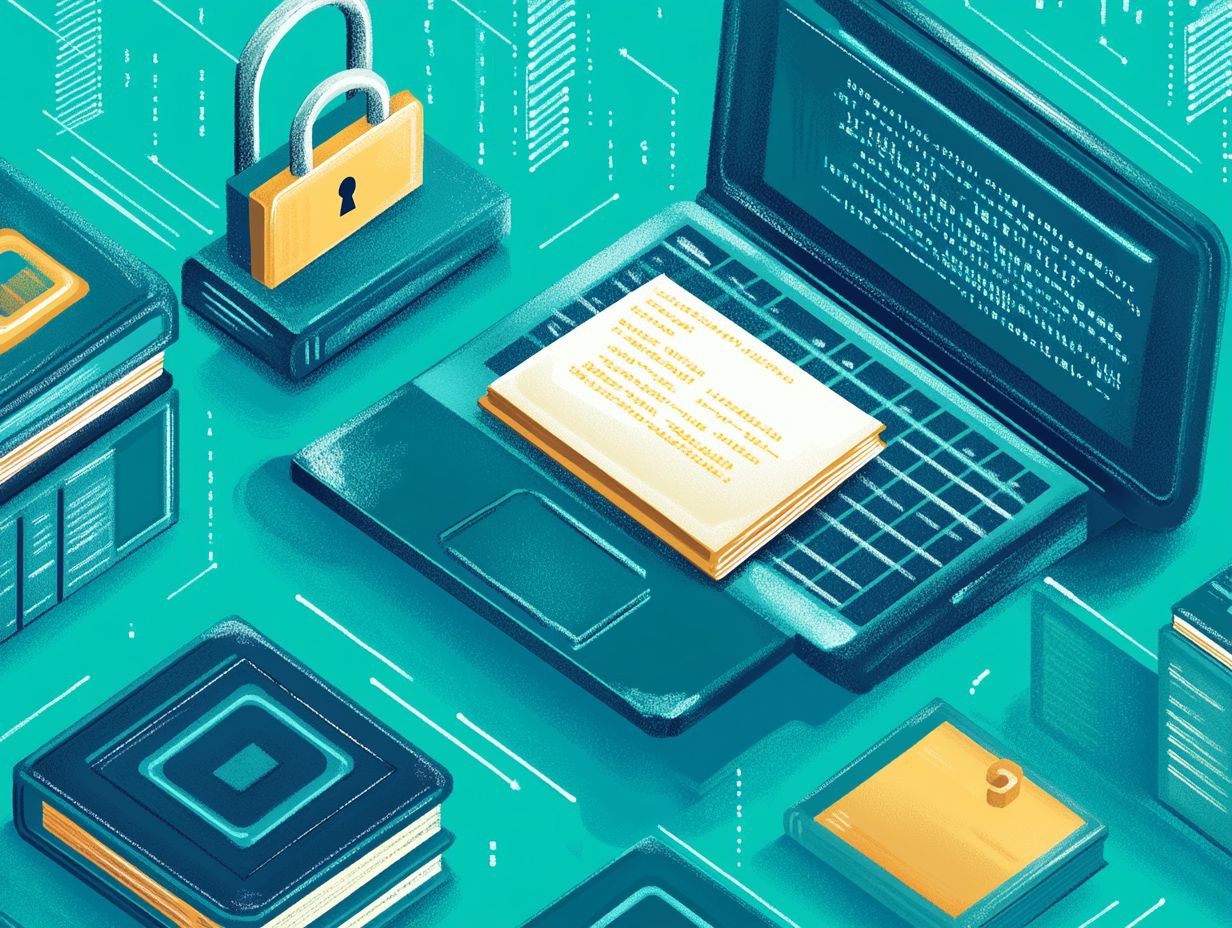Top 10 Resources for Learning Cybersecurity
In today s digital landscape, the significance of cybersecurity is paramount. As threats continue to evolve, so must your knowledge and skills.
Whether you re just starting out or aiming to expand your expertise, identifying quality resources is essential. This article showcases the top 10 resources for mastering cybersecurity, featuring engaging online courses, insightful blogs, interactive webinars, and podcasts that will keep you informed.
You ll also get guidance on how to select resources that align with your career aspirations, empowering you to navigate the ever-changing realm of cybersecurity with confidence.
Contents
- Key Takeaways:
- 1. Online Courses and Tutorials
- 2. Cybersecurity Blogs and News Websites
- 3. Online Communities and Forums
- 4. Webinars and Virtual Conferences
- 5. Books and E-books
- 6. Podcasts and Audio Resources
- 7. Certifications and Training Programs
- 8. Government Websites and Resources
- 9. Cybersecurity Events and Workshops
- 10. Online Tools and Simulators
- How to Choose the Right Resources for Your Learning Goals?
- Frequently Asked Questions
- What are the top 10 resources for learning cybersecurity?
- What are some popular online courses for learning cybersecurity?
- Are there any free resources for learning cybersecurity?
- What are the best books for learning cybersecurity?
- Are there any hands-on training resources for learning cybersecurity?
- What are some recommended cybersecurity certifications?
Key Takeaways:

Online courses give you a clear path to mastering cybersecurity!
Stay updated with the latest news and trends through blogs, news websites, and online communities.
Attending webinars, conferences, and workshops can provide valuable insights and networking opportunities in the cybersecurity field.
1. Online Courses and Tutorials
In today’s rapidly evolving cybersecurity landscape, the significance of online courses and tutorials is undeniable. These resources are a must-have for aspiring cybersecurity professionals and enthusiasts like you, eager to hone skills in ethical hacking, penetration testing, and incident response.
Utilizing free training options, such as Capture The Flag (CTF) platforms like TryHackMe and Hack The Box, can be very helpful. You have a wealth of platforms at your disposal, each offering a diverse range of programs tailored to various skill levels and interests.
For example, Cybrary boasts a robust selection of courses that cater to both beginners and advanced users. Meanwhile, MIT’s cybersecurity resources delve into cutting-edge research and methodologies that could inspire your learning journey.
SANS training stands out with its high-quality, intensive courses that are well-respected in the industry. The beauty of self-paced learning means you can progress at your own speed, making it easier to juggle education with work or personal commitments.
Engaging in hands-on labs will enhance your practical skills. Earning certifications like CompTIA will validate your expertise, increasing your appeal in a competitive job market.
2. Cybersecurity Blogs and News Websites
Cybersecurity blogs and news websites are invaluable resources, providing you with timely information about the latest trends, security incidents, and best practices. They help you stay informed about vulnerabilities and emerging threats in the ever-evolving landscape of information security.
Among the most influential platforms, Krebs on Security and The Hacker News truly stand out. These resources deliver not just breaking news but also in-depth analyses of significant cyber threats, placing them within the context of their implications for organizations and security strategies.
By offering expert commentary and insightful case studies, they give you the power to grasp the evolving nature of cyber risks. The engaging style of their articles encourages you to think critically about your own security practices, fostering a culture of awareness that is essential in today s digital environment.
3. Online Communities and Forums
Online communities and forums are invaluable resources for you as a cybersecurity professional, offering platforms to share knowledge, tackle hacking challenges, and seek guidance on security training and career development.
Platforms like Reddit’s r/cybersecurity and Stack Exchange create spaces where you can connect with like-minded peers, learning from their triumphs and missteps while deepening your understanding of complex topics.
By joining these discussions, you not only gain insights into emerging threats and innovative solutions, but also tap into the collective experience of a diverse community. Engaging in these communities provides real-time feedback on your projects or threats, making it much easier for you to stay ahead in the fast-paced world of cybersecurity.
This kind of collaboration can significantly enhance your skills and boost your career prospects.
4. Webinars and Virtual Conferences
Webinars and virtual conferences have become essential platforms for you as a cybersecurity professional to sharpen your skills. These events allow you to glean insights from industry experts and stay abreast of the latest advancements in incident response and risk management.
These venues offer not only a distinctive environment for learning but also create meaningful networking opportunities with peers and leaders in the field. You have the chance to engage with thought leaders from esteemed organizations like ISACA and EC-Council. They regularly host a variety of captivating webinars centered on practical applications of security training programs.
This interaction enables you to collaborate, share experiences, and explore innovative strategies. You will also access cutting-edge research that enhances your practices and fortifies your defenses against ever-evolving threats.
5. Books and E-books
Books and e-books present a vast treasure trove of educational resources for you as you seek to deepen your cybersecurity knowledge. They cover a wide range of topics, including ethical hacking, security frameworks, and the vulnerabilities that you, as a professional, must manage in the information security landscape.
These resources are invaluable foundational tools for newcomers and also offer advanced insights that seasoned experts can utilize to stay ahead of evolving threats.
For example, “The Web Application Hacker’s Handbook” by Dafydd Stuttard and Marcus Pinto delivers comprehensive guidance on identifying web vulnerabilities. This book is essential reading for anyone preparing for penetration testing testing security systems by simulating attacks roles or certifications like the CEH.
The Cybersecurity Playbook by Allison Cerra offers practical frameworks that enhance organizational security measures. This benefits both job seekers and current professionals eager to advance their careers.
6. Podcasts and Audio Resources

Podcasts and audio resources are quickly becoming the top choice for you, the cybersecurity enthusiast, looking to enhance your security awareness and knowledge while on the move. They cover a wide array of topics, from IT security to the latest trends shaping the cybersecurity landscape.
Among these gems, shows like Darknet Diaries and Security Now truly shine, thanks to their engaging storytelling and expert interviews. Darknet Diaries captivates with thrilling narratives that dive deep into real-life hacking incidents, while Security Now offers in-depth discussions with cybersecurity professionals, making complex issues feel accessible and relatable.
These audio formats not only provide you with valuable insights from guest experts but also serve as a fantastic complement to your visual learning tools. By weaving auditory content into your study routine, you can cultivate a more comprehensive understanding of key concepts, giving you the power to navigate the ever-evolving world of cybersecurity with confidence.
7. Certifications and Training Programs
Certifications and training programs are vital for you as a cybersecurity professional. They offer formal recognition of your skills and knowledge in crucial areas like ethical hacking, vulnerability assessment, and incident response. With a variety of options available from reputable organizations such as CompTIA, SANS, and EC-Council, the choices can be abundant.
If you’re looking to solidify your career in this dynamic field, consider paths like:
- CompTIA Security+
- Certified Ethical Hacker (CEH)
- Certified Information Systems Security Professional (CISSP)
Each of these certifications showcases your expertise while significantly boosting your job prospects and potential for career advancement. Specialized training programs will equip you with practical skills designed to tackle real-world cybersecurity challenges, ensuring you re well-prepared to confront the complex security threats that organizations face today.
8. Government Websites and Resources
Government websites and resources are valuable sources of information on cybersecurity best practices, security policies, and risk management strategies.
They serve as essential reference points for professionals and organizations aiming to enhance their security posture.
Among these invaluable tools, you will find the NIST Cybersecurity Framework and NSA guidelines, both crafted to promote comprehensive security practices.
The NIST Cybersecurity Framework presents a flexible yet robust approach to managing cybersecurity risks, offering a systematic methodology that can be tailored to meet your specific needs.
The NSA guidelines offer clear recommendations that bolster your existing security measures, ensuring compliance with various regulatory requirements.
Together, these resources empower you to establish effective cybersecurity programs that not only defend against evolving threats but also cultivate a culture of compliance and risk awareness at every level of your organization.
9. Cybersecurity Events and Workshops
Cybersecurity events and workshops are crucial for your growth if you’re seeking hands-on experience and valuable networking opportunities.
They allow you to engage with peers, learn from experts, and participate in practical security training exercises.
Gatherings like the renowned Black Hat and DEF CON attract industry leaders and enthusiasts, providing a platform for discussing cutting-edge topics such as threat intelligence, ethical hacking, and the latest security technologies.
Local workshops further enrich this experience, concentrating on specific skills or certifications that can deepen your knowledge.
The importance of networking at these events is immense; forging connections with fellow professionals can lead to job opportunities, mentorship, and collaboration on projects, all of which can significantly propel your career in the competitive cybersecurity landscape.
10. Online Tools and Simulators
Online tools and simulators are essential resources for you as an aspiring cybersecurity professional.
They offer practical environments that allow you to develop skills in testing for security weaknesses, security analysis, and ethical hacking while mastering critical Linux competencies.
Among these, platforms like DVWA (Damn Vulnerable Web App) and Hack The Box truly shine, providing unique, hands-on labs that mimic real-world scenarios.
DVWA, for instance, enables you to safely explore various web vulnerabilities, allowing you to practice your skills without any risk.
On the other hand, Hack The Box offers a range of immersive challenges, from the basics to advanced techniques, fostering a community-driven learning experience.
Both platforms empower you to grasp complex security issues deeply, encouraging you to refine your technical abilities in a controlled and supportive environment.
This practical approach not only builds your confidence but also equips you for the ever-evolving challenges of the cybersecurity landscape.
How to Choose the Right Resources for Your Learning Goals?
Choosing the right resources for your cybersecurity learning journey involves a careful evaluation of your current skill set, desired outcomes, and the type of training that aligns with your career aspirations be it through self-paced courses, certifications, or hands-on labs.
To get started, conducting a thorough assessment of your existing knowledge can be immensely beneficial.
This process not only highlights your strengths but also pinpoints specific areas in need of improvement.
Once you ve identified those gaps, setting clear and achievable goals tailored to your aspirations becomes crucial.
Matching these objectives with suitable resources, such as reputable online courses or specialized training programs, helps streamline your learning process.
Engaging with community platforms fosters collaborative learning, providing insights and shared experiences that enrich your understanding.
Ultimately, the synergy between well-defined goals and quality resources can significantly enhance your expertise and confidence in the ever-evolving field of cybersecurity.
What Are the Essential Skills for Cybersecurity Professionals?

Essential skills for cybersecurity professionals encompass a diverse array of competencies. These include risk management, incident response, security analysis, and deep knowledge of security rules and best practices.
These skills empower you to identify vulnerabilities before they can be exploited. You can also craft strategies to mitigate risks and respond decisively when incidents arise.
For example, mastering risk management allows you to evaluate potential threats to organizational assets. This ensures that priorities are set effectively.
Incident response training helps you act quickly during data breaches, minimizing any damage that may occur.
In this fast-paced field, the importance of continuous learning cannot be overstated. Emerging technologies and techniques demand that cybersecurity experts stay updated on the latest advancements.
Engaging in certifications, attending workshops, and participating in simulations not only enhance your expertise but also ensure you remain prepared to confront the ever-evolving landscape of threats.
What Are the Latest Trends and Technologies in Cybersecurity?
The latest trends and technologies in cybersecurity reveal an escalating emphasis on cloud security, automation, and proactive strategies. These efforts tackle vulnerabilities and ever-evolving cyber threats that are redefining the cybersecurity landscape.
As you navigate the transition to more dynamic environments, consider leveraging AI-driven security tools. These tools provide real-time threat detection and response capabilities.
Adopting a zero trust architecture highlights the critical need for a rigorous verification process. This effectively challenges the traditional perimeter-based security model.
Incident response automation further enhances your ability to address breaches swiftly. This can significantly minimize potential damage.
Collectively, these advancements optimize your security measures and necessitate the evolution of conventional security policies. They encourage a more integrated and forward-thinking approach to risk management.
How Can One Stay Updated with the Constantly Evolving Cybersecurity Landscape?
Stay ahead of the game! To keep up with the fast-changing cybersecurity world, you need to take action. Explore online resources, engage with community platforms, and keep an eye on industry news and trends.
To achieve a comprehensive understanding, consider subscribing to reputable cybersecurity news blogs. These deliver timely insights and expert opinions.
Engaging with podcasts focused on security topics can also provide diverse perspectives and real-world scenarios that enrich your knowledge.
Attending webinars offers interactive learning opportunities and the chance to discuss pressing issues with professionals who possess hands-on experience in the field.
Building a robust professional network by connecting with peers and industry leaders can significantly enhance your knowledge base.
By prioritizing continuous learning and awareness, you can effectively navigate and respond to emerging threats and developments in the cybersecurity realm.
What Are the Career Opportunities in Cybersecurity?
Career opportunities in cybersecurity are expansive and multifaceted. They encompass roles in incident response, penetration testing, and information security management, among others.
This diversity reflects the soaring demand for cybersecurity talent across various industries. To excel in these roles, you’ll need a well-rounded skill set that includes analytical thinking, technical prowess, and a solid grasp of cybersecurity frameworks.
While entry-level positions may start at around $60,000, more seasoned professionals can command salaries exceeding $100,000, depending on their specialization and geographical location.
Essential qualifications typically include degrees in computer science or information technology, complemented by certifications such as CISSP, CEH, or CompTIA Security+.
With the cybersecurity job market poised for significant growth in the coming years, pursuing the relevant training and certifications is vital for anyone looking to secure a competitive edge in this dynamic field.
How Can One Start a Career in Cybersecurity?
Starting a career in cybersecurity requires education, practical experience, and relevant certifications. These elements lay a solid foundation for success in this growing field.
To begin, consider enrolling in accredited degree programs or online courses focused on cybersecurity. Join special training courses to further build your skills.
Hands-on labs and practical challenges are essential. This real-world experience provides insights that you won’t get from theory alone.
Networking is vital. Connect with peers, attend conferences, and join online forums to share insights and build connections.
Embrace continuous learning through workshops and current industry publications. Stay informed about evolving threats and technologies.
Stay ahead of the curve and shine in cybersecurity!
Frequently Asked Questions
What are the top 10 resources for learning cybersecurity?

The top resources for learning cybersecurity include online courses, webinars, blogs, and podcasts. Books and YouTube channels also offer great insights.
What are some popular online courses for learning cybersecurity?
Popular online courses include “Introduction to Cybersecurity” by edX, “Cybersecurity Essentials” by Coursera, and “Cybersecurity Fundamentals” by Udemy.
Are there any free resources for learning cybersecurity?
Yes, “Cybrary,” “OpenSecurityTraining,” and “Cybersecurity Online” offer free courses and resources. These platforms provide valuable materials at no cost.
What are the best books for learning cybersecurity?
Top books include “The Basics of Hacking and Penetration Testing” by Patrick Engebretson and “Cybersecurity for Dummies” by Joseph Steinberg. “The Art of Invisibility” by Kevin Mitnick is also highly recommended.
Are there any hands-on training resources for learning cybersecurity?
Yes, platforms like “HackTheBox,” “TryHackMe,” and “OverTheWire” offer hands-on training. They provide virtual labs and challenges to practice real-world scenarios.
What are some recommended cybersecurity certifications?
Recommended certifications include Certified Information Systems Security Professional (CISSP) and Certified Information Security Manager (CISM). These prove your expertise in cybersecurity.





